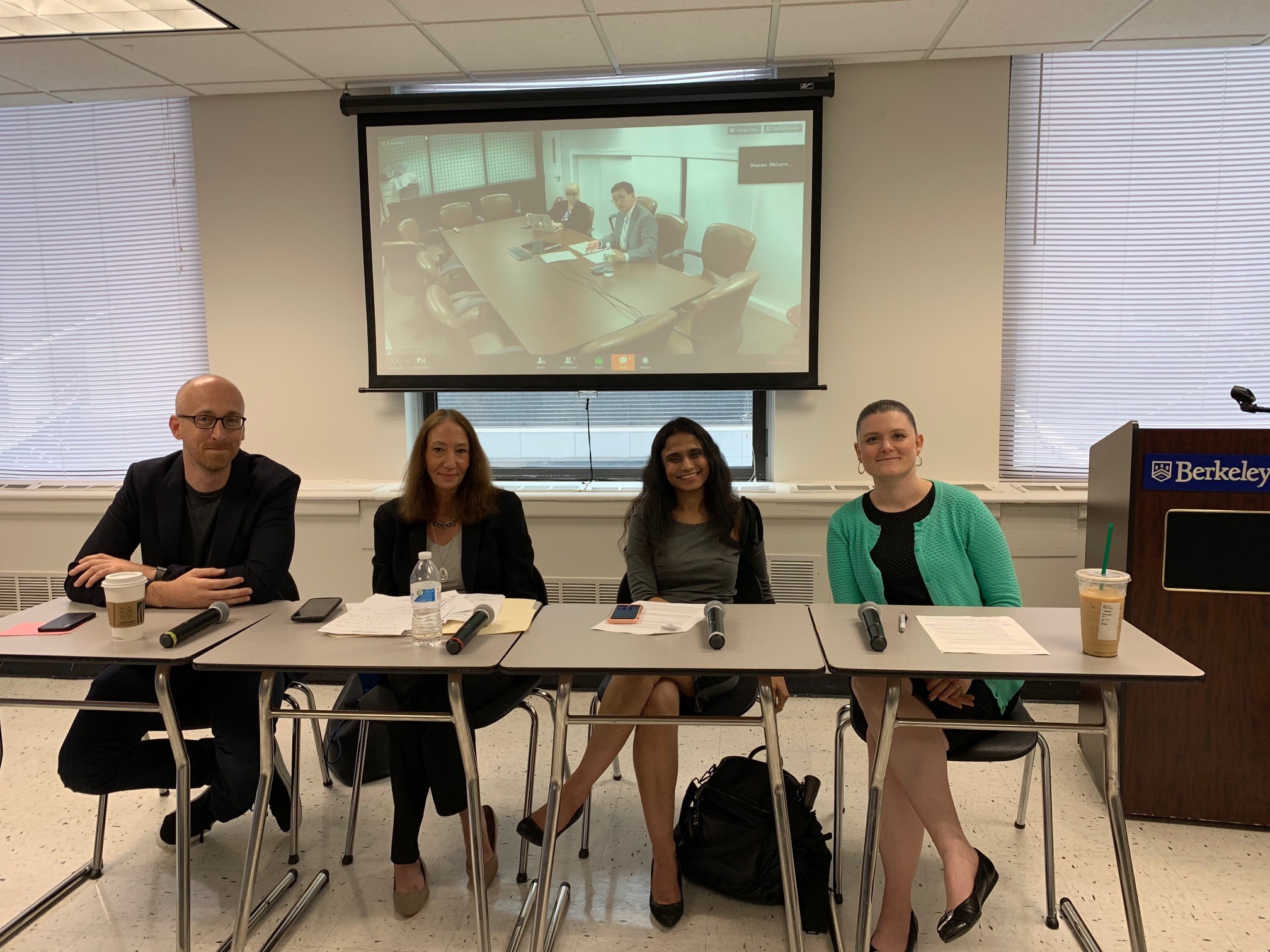Symposium Presents Blockchain Technology Perspectives
 |
|
| FOR IMMEDIATE RELEASE MONDAY, JUNE 24, 2019 |
Contact: Ilene Greenfield Director of Media Relations 973-278-5400, Ext. 1-5122 IGL@BerkeleyCollege.edu |
|
LIBRARY SPRING SYMPOSIUM PRESENTS BLOCKCHAIN TECHNOLOGY PERSPECTIVES Panelists Comprise Faculty from Berkeley College Larry L. Luing School of Business®, Librarians, and Leaders in Career Services and Information Systems |
|

The Berkeley Library Spring Symposium presented a number of viewpoints that provided students with various perspectives on blockchain technology, including how it is impacting our world and its influence on careers.
“Blockchain is projected to be a $60 billion global market by 2024,” said Professor Jonathan Ng, PhD, Assistant Chair, Management, Berkeley College Larry L. Luing School of Business®. “Put simply, blockchain is essentially a distributed digital ledger system which records and stores transactions immutably using cryptographic mechanisms. It is a big deal because it has potential to fundamentally change the way information is stored and shared. More importantly, blockchain technology provides a platform for how assets could be transacted or exchanged without intermediaries, more securely, relatively cost-effectively, and possibly more responsibly or transparently.”
Dr. Ng reports there have been encouraging results already. Using blockchain technology as an immutable system of record or as a transaction platform is under way in industries that include banking and finance, insurance, healthcare, food, real estate and title management, supply chain and distribution industry, as well as in the protection of digital content creation and intellectual property.
According to an article published on blockgeeks.com, a blockchain is a growing list of records, called blocks, which are linked using cryptography. Each block contains a cryptographic hash of the previous block, a timestamp, and transaction data. By design, a blockchain is resistant to modification of the data. A blockchain is an open, distributed ledger that can record transactions between two parties efficiently and in a verifiable and permanent way. Cryptography or cryptology is the practice and study of techniques for secure communication.
Dana Kilcrease, Senior Programmer Analyst, Berkeley College Information Systems, also touched upon the various industries, aside from banking, that use blockchain technology, including pharmaceutical and retail businesses such as those in jewelry and fashion. Jessica Kiebler, Librarian, said that companies and journalists are interested in the technology because of the complexity of fake news. They use blockchain technology in two ways – to remove the profitability aspect that includes advertising based on clicks, and to verify real humans, not bots, as the sources.
“The combination of explosive blockchain job growth and the interest of jobs seekers has created a tumultuous environment, where the leading employers are competing over top-notch talent,” added Amy Soricelli, Vice President, Career Services. She urged students to become familiar with the technology, and research how companies in their future fields of employment are using this technology.
In the fall 2019 semester, Professor Darshan Desai, PhD, Management, Berkeley College Larry L. Luing School of Business, and Rahul Bedi, PhD, Chair, Management, Berkeley College Larry L. Luing School of Business® will co-teach a course titled “Artificial Intelligence, Blockchain, and Financial Modeling.”
Photo Caption: The Berkeley Library Spring Symposium presented a number of viewpoints that provided students with various perspectives about blockchain technology, including how it is impacting our world and its influence on careers.Presenters seated at the table in front (left to right) are Dana Kilcrease, Senior Programmer Analyst, Information Systems; Amy Soricelli, Vice President, Career Services; Professor Darshan Desai, PhD, Management, Larry L. Luing School of Business; and Jessica Kiebler, Librarian, Library Services, all of Berkeley College. Participating via Zoom on screen in photo above them, are Bonnie Lafazan, Librarian, Library Services, and Professor Jonathan Ng, PhD, Assistant Chair, Management, Larry L. Luing School of Business, also of Berkeley College. Amanda Piekart, Librarian, Library Services, moderated the Symposium. In the fall Dr. Desai will co-teach a course titled “Artificial Intelligence, Blockchain, and Financial Modeling.” The Symposium was held on June 18, 2019, on campus and via livestream.
A leader in providing career-focused education since 1931, Berkeley College is accredited by the Middle States Commission on Higher Education and enrolls more than 7,000 students – including more than 350 international students – in its Master’s, Bachelor’s, and Associate’s degree and Certificate programs. Students can study in more than 20 career fields. Berkeley College is comprised of the Larry L. Luing School of Business®, the School of Professional Studies, the School of Health Studies and the School of Liberal Arts. The School of Graduate Studies offers an MBA in Management online and in Woodland Park, NJ.
Berkeley College has three New York campuses – Midtown Manhattan, Brooklyn and White Plains. In New Jersey there are four campuses – Newark, Paramus, Woodbridge and Woodland Park. Berkeley College Online® serves a global population. For six consecutive years, U.S. News & World Report has named Berkeley College among the Best Colleges for Online Bachelor’s Programs and among the Best Online Bachelor’s Programs for Veterans. The website address is www.BerkeleyCollege.edu.
- end -
To view a high-resolution version of this photo, visit:
https://berkeleycollege.edu/newsroom/images/ALL_Blockchain_Photo.jpg

